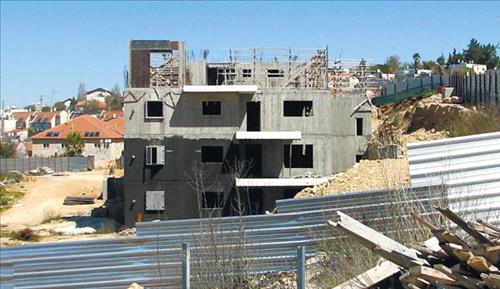Ammon News - (Haaretz) - Israeli cellular companies pay the local council in the West Bank settlement of Beit El thousands of shekels every month to keep communications equipment on private Palestinian land just outside the settlement's jurisdiction.
According to a conservative estimate, the Beit El local council has made hundreds of thousands of shekels over the past 13 years for keeping two communications structures at Jabel Artis. One of the structures belongs to Partner and Mobile Hot (formerly Mirs), and the other belongs to Pelephone and Cellcom.
The payments came to light when Partner submitted an initial response to a petition by Palestinians demanding the evacuation of buildings built on their private land at Jabel Artis.
The petition to the High Court was submitted on June 4 by attorneys Husaam Younes and Kamel Natour on behalf of six Palestinians from the village of Dura al Qar'a and the head of the village council. They demand the removal from land they own nine buildings, around 30 trailers, a water reservoir, the two communication centers and the fence that surrounds area. The nine buildings are part of the Ulpana neighborhood , where five buildings were already evacuated and dismantled last year, following a 2008 petition of other Dura al Qar'a residents and a High Court order.
The Civil Administration has issued demolition orders against all the buildings and trailers, as well as the Pelephone pole, to which antennae are attached.
Partner was the first company to build equipment at the site – which belongs to the late Zagloul Hassan – in the beginning of 2000. According to court documents submitted by Partner's attorneys Yaakov Cohen and Orly Vidan, Partner signed a contract with the Beit El council on July 18, 2000, stipulating that "Partner is permitted to use the land in return for monthly rent." The attorneys added in their response to the Jabel Artis petition that Partner has indeed paid the settlement council every month for the past 13 years.
According to the response, the Civil Administration issued permits for the communications equipment, as did the Environmental Protection Ministry official responsible for the monitoring of non-ionizing radiation.
In May 2006, Mirs (now Hot Mobile) put up its equipment at the site, again on land owned by Hassan.
Pelephone responded to the petition by stating that it had put up the pole in 2003 (the demolition order states that it went up in 2004) after also signing a contract with the Beit El council. Attorneys Guy Tsafrir and Ron Schwartz, writing on behalf of Pelephone, stated that it was a temporary pole "placed on Pisgat Ya'akov near Beit El … according the permit by the owner of the land – the Beit El local council."
The Beit El local council declined to respond to Haaretz's questions on July 11 regarding the payments received from the cellular phone operators over the years. The local council also refused to comment on its use of land that is beyond its jurisdiction and which it does not own.
Spokespeople for Pelephone and Partner said they do not reveal details about their commercial contracts. But a source at Partner told Haaretz on Sunday that such rental agreements are open to negotiation and that there is no fixed fee.
Amitai Ziv reported in The Marker on January 10, 2012, that the sums for these types of agreements usually range from NIS 4,000 to NIS 6,000 a month.
Both cellular operators, as well as the Beit El local council and the state, have requested that the petition be rejected outright, in limine. Partner, Pelephone and the Beit El council point to the significant amount of time that has elapsed since the buildings and communications poles were constructed. Furthermore, they argue that the petition should be heard in a civil court.
The cellular companies also mentioned the security value of the poles and the huge costs of constructing them.
Partner's attorneys are also claiming that the Palestinians did not prove ownership of the land. Attorney Akiva Sylvetzky, representing the Beit El settlement, furthermore states that it would be difficult for the petitioners to prove do so.
According to Sylvetzky, the inheritance order for the plot where the poles were built appears to have been printed by the Palestinian Authority, but bears the date November 1979. Natour responded that the petitioner is the son and heir of the owner, who appears in land registration records. The document, Natour says, was printed by the Palestinian Authority using the old 1979 records and is thus a valid and legitimate record.
Sylvetzky added that even if the petitioners did prove ownership of the land, the Beit El council could argue that the statute of limitations has already passed.
Sylvetzky also noted that the government had funded development on part of the plot "while the government encouraged settling in the area."
The respondents did not reply to the claim that the land is actually located several hundred meters beyond the jurisdiction of the local council.
Ownership records for most land in the Ramallah area were registered during Jordanian rule, and the Civil Administration has all the registry records. Younis argues that the statute of limitations does not apply to such lands.
The current petition and the former Dura al Qar'a petition (filed by Yesh Din) are based on the information revealed by Dror Etkes, who started researching the settlements' land grab back in 2002 when he was employed by the NGO Peace Now. The documents he obtained about Jabel Artis clearly the land there is owned by Palestinians and orderly registered.
